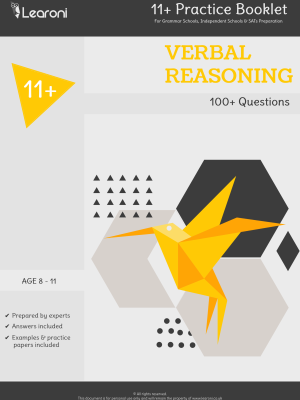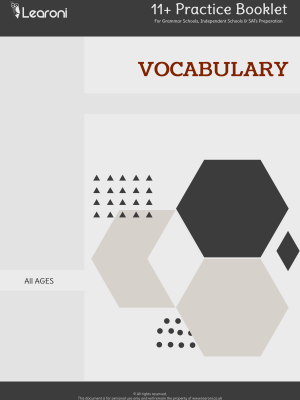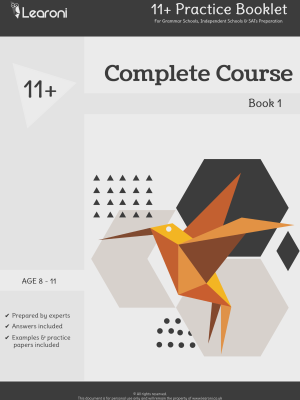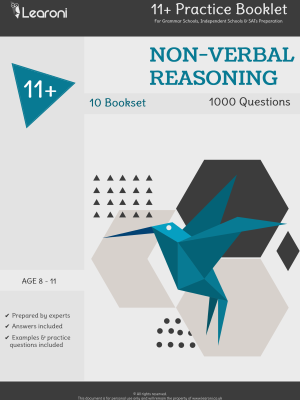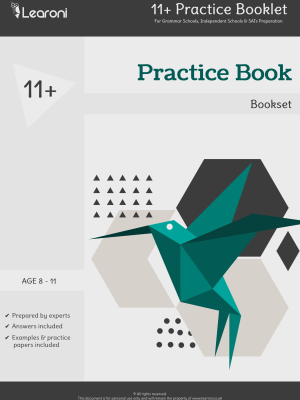Subtotal: £4.99
Instant unlimited download
Subtotal: £4.99
Instant unlimited download
Preparing for the 11 Plus exam is a major milestone in your child’s education, and with the right guidance, it can be a rewarding journey. At Learoni, we know how vital it is to start 11 plus preparation at the right time, with the right strategy, and using the right resources. Our premium 11+ preparation books are designed to support every type of learner on their unique journey.
In this extended guide, we answer your most pressing questions about the 11+ exam: when should your child begin studying, how much time to dedicate daily, what types of materials work best, and how to navigate different exam boards and school expectations. Whether you’re new to the process or already exploring grammar school options.
✅What Is the 11 Plus Exam, and Who Is It For?
The 11 Plus (11+) exam is an entrance examination taken by students in Year 6, usually aged 10 or 11, for admission into selective grammar schools and some independent schools in the UK. The test aims to assess a child’s academic potential rather than knowledge of a set curriculum.
Core Subjects in the 11 Plus Exam:
- English
Reading comprehension, grammar, spelling, vocabulary, and sometimes creative writing. - Maths
Problem-solving, arithmetic, logic, and data interpretation. - Verbal Reasoning
Analysing and manipulating verbal information. - Non-Verbal Reasoning
Interpreting patterns and sequences using shapes and diagrams.
Some independent schools may also include interviews, creative writing, and additional subject testing.
- English
11+ Ultimate Bundle (Learn & Practice)
View Sample Learn Book View Sample Practice Book
The most comprehensive 11+ preparation course to boost your child’s chances for a place at most of the selective Grammar and Independent Schools. The course covers all major areas of the 11+ exam:- English
- Maths
- Vocabulary
- Verbal Reasoning
- Non-verbal Reasoning
- Comprehension
Checkout detailed list of subjects covered
This is a complete course to assist your child in building the skills required to prepare for the 11+ exam. Your child can benefit from this course to:- prepare for the 11+ exam to get a place at the most selective grammar schools.
- get a place at the most selective independent schools.
- boost your child's confidence to achieve top sets at their secondary school.
- increase your child's chance to qualify for important scholarships and bursaries.
11 Plus Non-Verbal Reasoning Book set (NVR)
- Improved Spatial Awareness
- Increased Cognitive Flexibility
- Boosted Analytical Thinking
- Fostering concentration
- Preparation for Various Assessments
Complete 11+ Practice Books Set – 50 Books for Maths, English, Reasoning
When Should You Start Preparing for the 11 Plus Exam?
There is no one-size-fits-all answer, but starting preparation by Year 4 (ages 8–9) is widely recommended. This gives children plenty of time to build strong foundations, especially if they are unfamiliar with verbal and non-verbal reasoning questions.
Preparation Timeline:
Year 3 (A Gentle Introduction)
• Focus on building good reading habits.
• Play number games and word puzzles.
• Introduce fun logic games like Sudoku and simple reasoning tasks.
Year 4 (Laying the Foundations)
• Start exploring the exam format.
• Practise core skills in maths, vocabulary, and comprehension.
• Begin light verbal and non-verbal reasoning activities.
Year 5 (Core Study Phase)
• Follow a structured weekly timetable.
• Use our expertly designed books for daily practice.
• Begin timed exercises and build exam stamina.
• Take diagnostic and mock tests every 6–8 weeks.
Year 6 (Final Refinement)
• Focus on full-length mock exams and revision.
• Work on weaker areas.
• Practice mindfulness and exam confidence techniques.
How Much Time Should Be Dedicated Daily to 11+ Preparation?
Consistency is the key. Here’s an age-based breakdown:
• Year 3: 10–15 minutes, 2–3 days a week.
• Year 4: 20–30 minutes, 3–4 days a week.
• Year 5: 30–45 minutes per day, 5 days a week.
• Year 6: 45–60 minutes per day (with breaks and light revision weeks).
Practice Tips:
• Use a rotating schedule: English, maths, reasoning, vocabulary.
• End each week with a light quiz or fun game.
• Avoid long cramming sessions.
• Incorporate revision with family activities (crosswords, spelling bees).
11 Plus Reading Comprehension Book
- Incorporates students into entertaining and educational activities to promote analytical abilities.
- Increases the ability to comprehend reading and critical thinking through focused practice exercises.
- Provides a systematic approach to improving language abilities, ensuring comprehensive preparation for the 11+ tests.
Exam Boards and Patterns Across the UK
Different regions use different boards. Knowing the right one helps target preparation.
1. GL Assessment
• Subjects tested individually.
• Often includes standard curriculum questions.
• Format: multiple-choice or standard format.
2. CEM (Now Phasing Out)
• Mixed topic papers.
• Emphasis on skills and less predictability.
• Includes comprehension, vocabulary, and problem-solving.
3. Independent School Exams
• May include creative writing, interviews, additional reasoning tests.
• Greater variation in structure.
Always confirm which board your target school uses.
✅ Essential To-Do List for 11+ Success
1. Research Schools Early: Check school websites for open days, test formats, and catchment areas.
2. Create a Study Schedule: Balance school, leisure, and prep time.
3. Invest in the Right Materials: Choose high-quality Learoni books and mock exams.
4. Take Practice Tests: Schedule one mock test per month in Year 5.
5. Track Progress: Use checklists and goal charts.
6. Build Vocabulary Daily: Use flashcards and our free 11+ vocabulary list.
7. Promote a Growth Mindset: Praise effort, not just results.
8. Include Breaks: Avoid burnout with weekends off and family days.
❌ What NOT to Do When Preparing for the 11 Plus
• Don’t panic and cram late in Year 5.
• Don’t copy other parents’ strategies blindly.
• Don’t ignore test techniques like time management and multiple-choice strategies.
• Don’t neglect your child’s mental health.
• Don’t skip verbal or non-verbal reasoning.
Common Exam Dates and Deadlines
| Region | Exam Month | Registration Opens | Exam Board |
| Kent | September | June | GL Assessment |
| Buckinghamshire | September | May | GL Assessment |
| Essex (CSSE) | September | May | CSSE |
| Birmingham | September | May | CEM / GL (varies) |
| Gloucestershire | September | May | GL Assessment |
| Northern Ireland | November | May | AQE/GL |
Tip: Keep a reminder for key deadlines and set a “mock test week” 1 month before the real one.
11+ Ultimate Bundle (Learn & Practice)
View Sample Learn Book View Sample Practice Book
The most comprehensive 11+ preparation course to boost your child’s chances for a place at most of the selective Grammar and Independent Schools. The course covers all major areas of the 11+ exam:- English
- Maths
- Vocabulary
- Verbal Reasoning
- Non-verbal Reasoning
- Comprehension
Checkout detailed list of subjects covered
This is a complete course to assist your child in building the skills required to prepare for the 11+ exam. Your child can benefit from this course to:- prepare for the 11+ exam to get a place at the most selective grammar schools.
- get a place at the most selective independent schools.
- boost your child's confidence to achieve top sets at their secondary school.
- increase your child's chance to qualify for important scholarships and bursaries.
11 Plus Non-Verbal Reasoning Book set (NVR)
- Improved Spatial Awareness
- Increased Cognitive Flexibility
- Boosted Analytical Thinking
- Fostering concentration
- Preparation for Various Assessments
Complete 11+ Practice Books Set – 50 Books for Maths, English, Reasoning
FAQs: When to start 11 plus preparation?
Q. When should we start preparing for the 11+ exam?
A. Ideally by Year 4 to build strong foundational skills without pressure.
Q. How early is too early to start 11+ preparation?
A. Starting in Year 3 is safe if the focus is light, fun learning.
Q, Can we prepare for the 11+ without a tutor?
A. Yes, with high-quality resources like Learoni’s books and consistent practice.
Q. How many hours per week should my child study for the 11+?
A. Varies by age—typically 3 to 5 hours per week in Year 4, up to 6–7 in Year 5.
Q. What if my child finds verbal or non-verbal reasoning hard?
A. Start with simplified exercises and gradually increase difficulty.
Q. What are the best books for 11+ exam preparation?
A. Learoni’s structured, subject-specific books and vocabulary resources are highly effective.
Q, What is a good daily 11+ study schedule?
A. Mix subjects daily; e.g., Monday – English, Tuesday – Maths, Wednesday – VR, and Thursday NVR etc.
Q. Are mock exams necessary for 11+ prep?
A. Yes. They simulate real conditions and highlight areas needing improvement.
Q. When should my child start doing mock tests?
A. Light mock testing from early Year 5, increasing to monthly or bi-weekly in Year 6.
Q. What’s the difference between GL and CEM 11+ exams?
A. GL is more predictable. CEM tests mixed skills with less familiar formats.
Q. What should I do if my child gets demotivated?
A. Reassess the schedule, include more breaks, and use positive reinforcement.
Q. Should we revise during holidays?
A. Yes, but keep it light—15–20 minutes a day to maintain consistency.
Q. Can 11+ prep affect school performance?
A. It can improve it if balanced correctly; focus on study-life harmony.
Q. What’s the best way to build 11+ vocabulary?
A. Use flashcards, reading, and Learoni’s free vocabulary list.
Q. Is handwriting important in the 11+ exam?
A. Yes, especially for creative writing and standard answer formats.
Q. Can I download free 11+ resources?
A. Yes. Check our free resources, which includes vocabulary lists, fraction sheets, word problems and more.
Q. Are there online 11+ practice platforms?
A. Yes. Combine them with books for a complete approach.
Q. Should I follow a fixed study timetable?
A. Yes, but allow flexibility for rest and extracurriculars.
Q. How do I know if my child is ready?
A. Mock test performance and confidence levels are key indicators.
Q. What happens if we start late?
A. Focus on key areas, reduce distractions, and follow an intensive, short-term plan.


